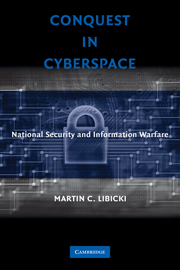Book contents
- Frontmatter
- Contents
- List of Figures
- Acknowledgments
- 1 Introduction
- 2 Hostile Conquest as Information Warfare
- 3 Information Warfare as Noise
- 4 Can Information Warfare Be Strategic?
- 5 Information Warfare Against Command and Control
- 6 Friendly Conquest in Cyberspace
- 7 Friendly Conquest Using Global Systems
- 8 Retail Conquest in Cyberspace
- 9 From Intimacy, Vulnerability
- 10 Talking Conquest in Cyberspace
- 11 Managing Conquest in Cyberspace
- Appendix A Why Cyberspace Is Likely to Gain Consequence
- Index
Appendix A - Why Cyberspace Is Likely to Gain Consequence
Published online by Cambridge University Press: 05 June 2012
- Frontmatter
- Contents
- List of Figures
- Acknowledgments
- 1 Introduction
- 2 Hostile Conquest as Information Warfare
- 3 Information Warfare as Noise
- 4 Can Information Warfare Be Strategic?
- 5 Information Warfare Against Command and Control
- 6 Friendly Conquest in Cyberspace
- 7 Friendly Conquest Using Global Systems
- 8 Retail Conquest in Cyberspace
- 9 From Intimacy, Vulnerability
- 10 Talking Conquest in Cyberspace
- 11 Managing Conquest in Cyberspace
- Appendix A Why Cyberspace Is Likely to Gain Consequence
- Index
Summary
Does cyberspace matter? Can societies deprived of their ability to use the commons of cyberspace (such as the routing infrastructure and standard software) nevertheless thrive unbowed?
It may be silly to conjure images of the horrors that would attend seeing the United States suddenly being thrown back to the primitive conditions of 1995, or, for most of the rest of the world, 2005. Yet, any topic that deals with war must be accorded at least a moment of seriousness. To ask whether cyberspace is the new high ground is just the latest version the age-old question: which medium dominates war? For example, did Britain's control of the seas prove decisive in World War I against a continental Germany? Does air superiority win ground campaigns?
The best answer to corresponding questions about cyberspace is neither “yes” nor “no” but “more so every day.” This appendix lays out some key vectors of technology to illustrate both the changing nature of cyberspace and its increasing pervasiveness in the real world. Understandably, the tendency to extrapolate infinitely from the bright past has gotten many people into financial trouble, especially those invested in dot-coms. Yet, while stock markets rise and fall, and consumer tastes can be fickle, technology is well nigh inexorable.
Even in the highly unlikely event that microprocessors never get faster (and they have not gotten much faster since 2002), the eventual retirement of all slower microprocessors in favor of new ones will raise the average speed of the entire stock of computers.
- Type
- Chapter
- Information
- Conquest in CyberspaceNational Security and Information Warfare, pp. 291 - 306Publisher: Cambridge University PressPrint publication year: 2007



